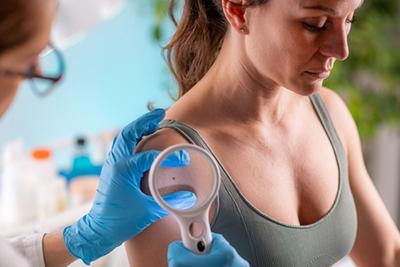Location
The ABCs of Skin Cancer: Detection, Prevention, and Treatment

- posted: Oct. 08, 2024
Skin cancer is when abnormal cell growth occurs in the skin. The primary cause is extensive exposure to ultraviolet (UV) rays from the sun or tanning beds. Three primary types—basal cell carcinoma, squamous cell carcinoma, and melanoma—vary in severity. Basal and squamous cell carcinomas often manifest as changes in skin texture, sores, or unusual growths, whereas melanoma can manifest as irregular moles with uneven borders and colors.
Paducah Dermatology addresses concerns related to skin cancer by offering thorough screenings and expert guidance. Early detection is paramount as skin cancer, if left untreated, can spread to other parts of the body and become life-threatening. Dermatologists use various methods, like visual examinations and biopsies, to accurately diagnose and develop personalized treatment plans.
Given Paducah's sunny climate, routine check-ups at the dermatologist are essential, especially for individuals with a history of sun exposure or those with fair skin. Protection against UV rays through sunscreen, protective clothing, and seeking shade helps mitigate risks.
The ABCs of Skin Cancer: Detection, Prevention, and Treatment
Skin cancer, comprising basal cell carcinoma (BCC), squamous cell carcinoma (SCC), and melanoma, warrants attention for early detection, prevention, and treatment. Detection begins with self-examinations, where asymmetry, irregular borders, color variations, diameter changes, and evolving moles signal concerns. Professional screenings are beneficial, especially for those at risk due to family history or prolonged sun exposure.
Prevention is using broad-spectrum sunscreen, seeking shade, wearing protective clothing, and avoiding peak sun hours. Regular skin checks and swift action upon spotting abnormalities are fundamental.
Treatment options for skin cancer vary based on the cancer type, stage, and individual health. Surgical removal such as an excision, and Mohs surgery are appropriate for BCC and SCC. Melanoma may require wider excisions, lymph node evaluation, immunotherapy, targeted therapy, or chemotherapy.
Visit Paducah Dermatology for Skin Cancer Prevention
If you notice new or changing moles, unusual growths, or skin lesions that worry you, regularly schedule appointments with a dermatologist. Additionally, if you have a family history of skin cancer, prolonged sun exposure, or a weakened immune system, early consultations are crucial. Annual check-ups benefit everyone, enabling early detection and timely intervention.
Please explore our website to learn about the conditions we treat and the services we provide. Prioritize skin health to embrace a sun-safe lifestyle and prevent skin cancer in Paducah, Benton, Murray, KY, and Martin, TN. Protect your skin with daily sunscreen, seek shade during peak hours, and schedule regular skin checks to ensure a brighter, cancer-free future. To book an appointment with one of our many providers at Paducah Dermatology, call (270) 444-8477.

- posted: Oct. 08, 2024
Skin cancer is when abnormal cell growth occurs in the skin. The primary cause is extensive exposure to ultraviolet (UV) rays from the sun or tanning beds. Three primary types—basal cell carcinoma, squamous cell carcinoma, and melanoma—vary in severity. Basal and squamous cell carcinomas often manifest as changes in skin texture, sores, or unusual growths, whereas melanoma can manifest as irregular moles with uneven borders and colors.
Paducah Dermatology addresses concerns related to skin cancer by offering thorough screenings and expert guidance. Early detection is paramount as skin cancer, if left untreated, can spread to other parts of the body and become life-threatening. Dermatologists use various methods, like visual examinations and biopsies, to accurately diagnose and develop personalized treatment plans.
Given Paducah's sunny climate, routine check-ups at the dermatologist are essential, especially for individuals with a history of sun exposure or those with fair skin. Protection against UV rays through sunscreen, protective clothing, and seeking shade helps mitigate risks.
The ABCs of Skin Cancer: Detection, Prevention, and Treatment
Skin cancer, comprising basal cell carcinoma (BCC), squamous cell carcinoma (SCC), and melanoma, warrants attention for early detection, prevention, and treatment. Detection begins with self-examinations, where asymmetry, irregular borders, color variations, diameter changes, and evolving moles signal concerns. Professional screenings are beneficial, especially for those at risk due to family history or prolonged sun exposure.
Prevention is using broad-spectrum sunscreen, seeking shade, wearing protective clothing, and avoiding peak sun hours. Regular skin checks and swift action upon spotting abnormalities are fundamental.
Treatment options for skin cancer vary based on the cancer type, stage, and individual health. Surgical removal such as an excision, and Mohs surgery are appropriate for BCC and SCC. Melanoma may require wider excisions, lymph node evaluation, immunotherapy, targeted therapy, or chemotherapy.
Visit Paducah Dermatology for Skin Cancer Prevention
If you notice new or changing moles, unusual growths, or skin lesions that worry you, regularly schedule appointments with a dermatologist. Additionally, if you have a family history of skin cancer, prolonged sun exposure, or a weakened immune system, early consultations are crucial. Annual check-ups benefit everyone, enabling early detection and timely intervention.
Please explore our website to learn about the conditions we treat and the services we provide. Prioritize skin health to embrace a sun-safe lifestyle and prevent skin cancer in Paducah, Benton, Murray, KY, and Martin, TN. Protect your skin with daily sunscreen, seek shade during peak hours, and schedule regular skin checks to ensure a brighter, cancer-free future. To book an appointment with one of our many providers at Paducah Dermatology, call (270) 444-8477.




